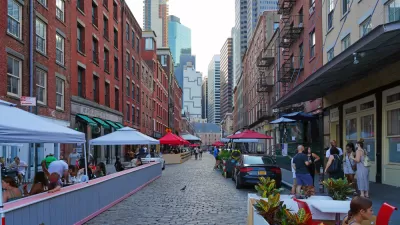In December 2019, the Downtown Brooklyn Public Realm Vision set ambitious goals for removing cars from one of New York's central business districts. Then came the pandemic and new tests for those ambitions.
Stakeholders in Downtown Brooklyn are building on a 2019 master plan that ranks as one of the most ambitious visions for car-free urbanism in the country.
The Downtown Brooklyn Partnership unveiled the Downtown Brooklyn Public Realm Vision in 2019, inspired in part by recent street redesigns in the city, like the pedestrianization of Times Square and the 14th Street Busway (Benjamin Schneider broke the news of the Public Realm Vision in December 2019).
A new article by John Schneider updates the progress toward achieving the master plan's ambitious vision—which includes a neighborhood network of Dutch-style shared streets, busways, protected bike lanes, and improvements to green spaces.
"It was a pedestrian-centric rebuke of the Robert Moses-era planning that dominates much of the borough, where cars flood wide streets en route to the Brooklyn and Manhattan Bridges," according to Surico.
With the pandemic generating unanticipated support for car-free reforms, the Downtown Brooklyn Partnership is hoping to build on that momentum by releasing the Downtown Brooklyn Public Realm Action Plan, a Covid-era update to the original master plan released earlier this month.
"The plan doubles down on the 2019 vision’s calls for pedestrianization, while picking up institutional support and a handful of tangible achievements since then. Not to mention a new streetscape paradigm: This is a city where pandemic-era curbside dining and 'Open Streets' are now permanent fixtures," writes Surico.
As detailed in the source article, linked below, the Downtown Brooklyn is far from alone in its efforts to pedestrianize New York City.
FULL STORY: Downtown Brooklyn’s Greener, Car-Free Future Is Taking Root

Maui's Vacation Rental Debate Turns Ugly
Verbal attacks, misinformation campaigns and fistfights plague a high-stakes debate to convert thousands of vacation rentals into long-term housing.

Planetizen Federal Action Tracker
A weekly monitor of how Trump’s orders and actions are impacting planners and planning in America.

In Urban Planning, AI Prompting Could be the New Design Thinking
Creativity has long been key to great urban design. What if we see AI as our new creative partner?

King County Supportive Housing Program Offers Hope for Unhoused Residents
The county is taking a ‘Housing First’ approach that prioritizes getting people into housing, then offering wraparound supportive services.

Researchers Use AI to Get Clearer Picture of US Housing
Analysts are using artificial intelligence to supercharge their research by allowing them to comb through data faster. Though these AI tools can be error prone, they save time and housing researchers are optimistic about the future.

Making Shared Micromobility More Inclusive
Cities and shared mobility system operators can do more to include people with disabilities in planning and operations, per a new report.
Urban Design for Planners 1: Software Tools
This six-course series explores essential urban design concepts using open source software and equips planners with the tools they need to participate fully in the urban design process.
Planning for Universal Design
Learn the tools for implementing Universal Design in planning regulations.
planning NEXT
Appalachian Highlands Housing Partners
Mpact (founded as Rail~Volution)
City of Camden Redevelopment Agency
City of Astoria
City of Portland
City of Laramie




























